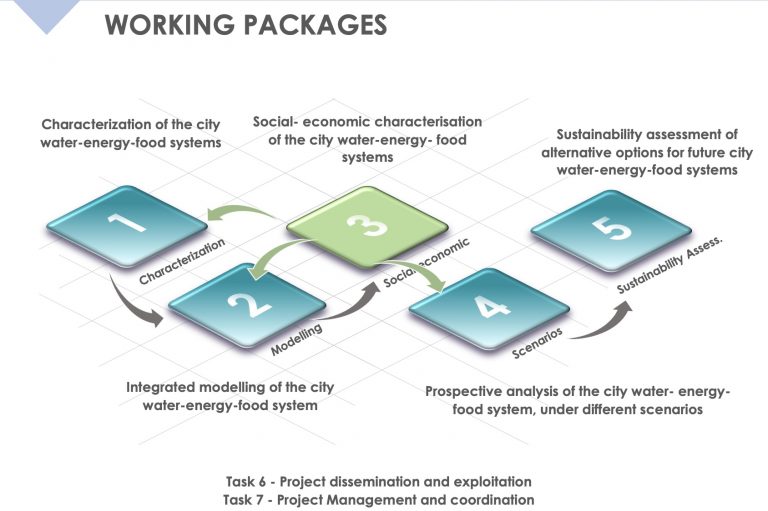
Objetive: Characterize the case study (Cascais municipality) regarding Water, Energy and Food (WEF) systems
Representation of all WEF systems will be stated through different information sources: national statistics at the municipal level, city technical departments, city/regional WEF suppliers, open information, scientific literature and results from one-day thematic workshop (in coordination with task 3.1).
WEF demand will be assessed considering state-of-the art methods as well as citizens’ socio-economic conditions and other relevant determinants such as building construction features. The socio-economic characterization will develop under task 3.3, namely the citizens’ survey.
Context of policy and regulatory framework associated with WEF self-sufficiency and sustainability
Objetives:
- Estimate the demand for WEF services from the reference year up to the time horizon of analysis, 2070
- TIMES_CityWEF model development
The services demand will be detailed primarily for the residential sector since it is at the core heart of this project. Data from tasks 1 and 3, as well as multiple data sources as needed, will be used.
Identify and characterize (technical and cost parameters from reference year up to 2070) current and future technologies and options for the WEF resource uses at the city scale, targeted both at resource supply and demand.
- Objetives:
- Local stakeholders engagement
Map and engage local stakeholders and link project scientific challenges to stakeholders’ concerns: through one-day structured workshop with city stakeholders The output of the workshop is a range inputs from all stakeholders on how interdependences are set up in the present (inputs for task 1), and mostly important how they should be approached in the future (input for task 3), namely in terms of new technologies, social practices and potential new locally-focussed economic, and business and consumption models.
- Citizens socio-economic characterization – survey
More than 600 citizens in-person survey (~30 minutes per survey) was done to, beside other specific objectives, link socio-economic profiles, and WEF preferences;
- City scenarios validation
Validate the various city scenarios generated by TIMES_CityWEF with local stakeholders and facilitate understanding of the project outputs
Objetives:
- Define Scenarios assumptions
Set up the scenarios to be further assessed , including the narratives by the TIMES_CityWEF. The different city visions build on by the local stakeholders in task 3.1 will serve as the basis for the future narratives of the city (storylines), and for explicit assumptions.
- TIMES_CityWEF model future pathways generation
TIMES_CityWEF model generation of a wide range of future pathways regarding the optimal portfolio of technologies and practices, and resources use to fulfil the energy, water and food demand up to 2070, take into consideration the storylines and assumptions, and constraints from task 4.1. These outputs will be organized to be presented at the second workshop (task 3.4) to the city stakeholders
Objectives:
- Environmental, social and economic metrics and indicators
Assess the metrics and indicators, covering environmental, social and economic dimensions, to be used to assess how alternative options (to WEF resource use endorsed in future pathways performs towards city sustainability
- Integrated WEF sustainable transition pathways
Develop over the city integrated WEF sustainable transition pathways to provide an outlook for local decision-makers, for investors and for an innovation and research agenda.
